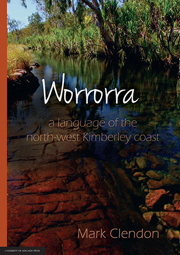Book contents
- Frontmatter
- Dedication
- Contents
- List of tables
- List of figures
- Abbreviations
- Acknowledgements
- Chapter One introduction
- Chapter Two segmental phonology
- Chapter Three morphophonology
- Chapter Four nouns and noun classes
- Chapter Five indicative mood and basic verbal morphology
- Chapter Six adjectives and inalienable nouns
- Chapter Seven pronouns, demonstratives, anaphors, deictics
- Chapter Eight optative, counterfactual and exercitive moods
- Chapter Nine number
- Chapter Ten adverbs and postpositional phrases
- Chapter Eleven complex predicates
- Chapter Twelve experiencer constructions
- Chapter Thirteen objects and possession
- Chapter Fourteen complement clauses
- Chapter Fifteen subjunctive verbs
- Chapter Sixteen middle voice
- Chapter Seventeen discourse cohesion
- Chapter Eighteen kinship terms
- Appendices
- References
Chapter Eleven - complex predicates
Published online by Cambridge University Press: 05 October 2014
- Frontmatter
- Dedication
- Contents
- List of tables
- List of figures
- Abbreviations
- Acknowledgements
- Chapter One introduction
- Chapter Two segmental phonology
- Chapter Three morphophonology
- Chapter Four nouns and noun classes
- Chapter Five indicative mood and basic verbal morphology
- Chapter Six adjectives and inalienable nouns
- Chapter Seven pronouns, demonstratives, anaphors, deictics
- Chapter Eight optative, counterfactual and exercitive moods
- Chapter Nine number
- Chapter Ten adverbs and postpositional phrases
- Chapter Eleven complex predicates
- Chapter Twelve experiencer constructions
- Chapter Thirteen objects and possession
- Chapter Fourteen complement clauses
- Chapter Fifteen subjunctive verbs
- Chapter Sixteen middle voice
- Chapter Seventeen discourse cohesion
- Chapter Eighteen kinship terms
- Appendices
- References
Summary
Introduction
Complex predicates, also called verbal compounds, constitute the commonest means of verbal expression in Worora. By text count such predicates are far more frequent than simplex verbal expressions. Complex predicates make use of a large and open word class that occurs in few other grammatical contexts: this is the lexical category that I will refer to as preverbal infinitives or preverbs. Worrorra preverbs are semantically verbal, while possessing syntactic properties of both nouns and adverbs. Complex predication, and the lexical category of preverbs it hosts, together constitute one of the defining features of Worrorra in typological terms, and is a characteristic areal feature of north-western Australia generally (see eg McGregor 2002, Amberber, Baker & Harvey (eds) 2010).
Complex predicates in Worrorra are typically composed of a preverb followed by an inflecting verb, here termed a verb classifier for reasons that will become apparent. Predicates of this type are not uncommon in Australia, where they have traditionally been referred to as compound verbs or verbplus-auxiliary sequences (eg Capell 1976:615 ff). Other terminologies include ‘root,’ ‘verb,’ ‘prefix,’ ‘infinitive,’ ‘particle,’ ‘uninflecting verb’ and ‘transparent event’ for initial elements, and ‘thematizing suffix,’ ‘root,’ ‘auxiliary,’ ‘classifier,’ ‘classifier complex,’ ‘light verb’ and ‘inflecting verb’ for final elements (Dixon 1980:426, Nash 1982, Silverstein 1986, McGregor 1990, 2002 and references therein, and Amberber, Baker & Harvey (eds) 2010).
- Type
- Chapter
- Information
- WorrorraALanguage of the North-West Kimberley Coast, pp. 273 - 309Publisher: The University of Adelaide PressPrint publication year: 2014



